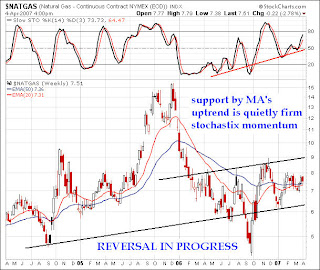The markets are closed today, and the economic news is limited. The new jobs data came out higher than expected pushing the USD index up. The analysts at Bloomberg say that wages are higher and jobs are more plentiful. This is supposed to lead to more consumer spending, and it might briefly. But let's face it the consumer is crunched and this news is purely inflationary, but that's not what I wanted to write about hence the name of the post.
I want to update you on the natural gas cartel that I mentioned in earlier posts. Next week 14 countries are meeting in Qatar and are expected to announce the formation of this natural gas cartel.
Much of the information I am getting on the subject right now is coming from Forbes, which is not the most credible in regards to economic impact in my opinion and I am going to try and sift through the spin. I do believe they are completely accurate when they say the cartel will announce its formation next week.
Forbes says that the impact of such a cartel will be quite limited and quiet. Like I wrote in the previous post on the subject, natural gas contracts are generally long term. In economics, we call them sticky. Like job contracts, they don't necessarily change very quickly with immediate economic indicators. Also, the price of natural gas usually, in one way or another, follows the price of crude. These items are very true.
The other aspect that Forbes is focusing on is that the U.S. gets very little natural gas from the 14 countries (they are not listed, but I will have them soon enough). Forbes says that roughly 80% of natural gas is consumed in the U.S. is domestically produced and the majority of imports come from Canada. Again, I cannot verify this information, but I believe it is true.
Let's do some reading between the lines here. The shear fact that this cartel is being formed speaks to a very important note. That note is that natural gas is in limited supply and is probably dwindling. The idea that natural gas contracts are long term and sticky is very well, and the impact of the cartel may be limited in the next 5-10 years, but I strongly believe that they will be able to maximize by limiting future contracts to a point. In the future, I expect the whole idea of long term contracts to either be adjustable to market rates, or non-existent altogether.
I want to update you on the natural gas cartel that I mentioned in earlier posts. Next week 14 countries are meeting in Qatar and are expected to announce the formation of this natural gas cartel.
Much of the information I am getting on the subject right now is coming from Forbes, which is not the most credible in regards to economic impact in my opinion and I am going to try and sift through the spin. I do believe they are completely accurate when they say the cartel will announce its formation next week.
Forbes says that the impact of such a cartel will be quite limited and quiet. Like I wrote in the previous post on the subject, natural gas contracts are generally long term. In economics, we call them sticky. Like job contracts, they don't necessarily change very quickly with immediate economic indicators. Also, the price of natural gas usually, in one way or another, follows the price of crude. These items are very true.
The other aspect that Forbes is focusing on is that the U.S. gets very little natural gas from the 14 countries (they are not listed, but I will have them soon enough). Forbes says that roughly 80% of natural gas is consumed in the U.S. is domestically produced and the majority of imports come from Canada. Again, I cannot verify this information, but I believe it is true.
Let's do some reading between the lines here. The shear fact that this cartel is being formed speaks to a very important note. That note is that natural gas is in limited supply and is probably dwindling. The idea that natural gas contracts are long term and sticky is very well, and the impact of the cartel may be limited in the next 5-10 years, but I strongly believe that they will be able to maximize by limiting future contracts to a point. In the future, I expect the whole idea of long term contracts to either be adjustable to market rates, or non-existent altogether.
I also want to talk briefly about a subject that I don't like to talk about because I am not well versed or extremely knowledgeable on, and that is global warming. It's such a political subject and probably more spun, by both sides, than any other issue. I just don't wish to confront the why of the topic, but it's impossible to ignore that the earth is getting warmer and warmer, whether it's man made or not.
All of the spin artists love to talk about how warmer winters means less dependency on natural gas. What they forget is that global warming is obviously not limited to winter. We are also experiencing warmer summers, and that means more use of air conditioning. People obviously get the idea that, in the winter, increased heating measures requires more natural gas. What they don't realize is that "most U.S. regions cool by air conditioning powered by gas-fired electrical generators." (Jim Willie)
I guess the point that I am getting at, is that cartel or not, higher natural gas prices are most definitely on their way.

(Jim Willie, Hat Trick Letter)
As this graph show (woohoo there's a graph in my post), natural gas, after breaking below its 50 and 20 day moving average (MA), it has broken back up and the picture looks very bullish. I expect natural gas prices to move up just at the announcement of this cartel, and if the cartel is effective in any way, it will only add to the bullish picture.

No comments:
Post a Comment